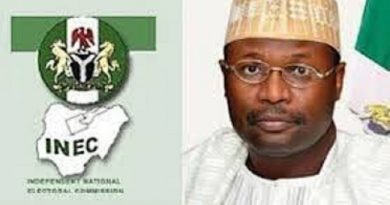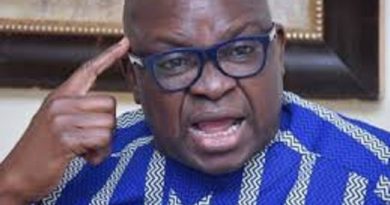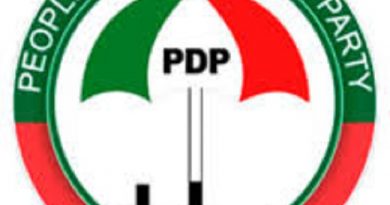END OF THE ROAD TO ECONOMY KILLING BUREAU DE EXCHANGE AND WELCOME TO NAIRA REVIVAL
In a bid to streamline the nation’s forex market and bring sanity in the foreign exchange system, the regulatory watchdog of Nigeria’s monetary system, the Central Bank of Nigeria, CBN, displayed uncommon supervisory courage with the recent embargo placed on weekly supply of forex to Bureau de Change (BDCs) in the country.
This decision came like a thunderbolt to a lot of investors, market watchers and pundits. Many Nigerians did not see it coming.
What the apex bank just did is tantamount to taking the recalcitrant bull by the horn in its noble quest to save the naira from downward spiral of depreciation and preserving depleting foreign reserve, amidst dwindling forex inflows from crude oil sales and increasingly rising debt burden. Nigeria’s economy is hemorrhaging; this is not time to pander to public sentiments and emotions. Most of the times, tough economic decisions do not resonate with populist yearnings.
Godwin Emefiele, like a proverbial leader of a group of surgeons in the intensive care unit, trying hard to save an endangered patient, got to that crescendo and needed to act pragmatically before it was too late. The CBN has managed BDCs like cancerous tumors for decades now, with little or no positive impact on the economy, especially naira. The cancerous cells kept expanding; eating deep into the fabrics of the economy, while the CBN struggled to manage it, at the same time ensured that the economy did not bleed profusely to death.
Arriving at a crossroad, the CBN had to wield the big stick—the cancerous tumor had to be surgically exorcised to save the rest of the body because a chain is as strong as its weakest link. The monetary policy watchdog is not oblivious of the temporary pains and fluctuations that this timely decision has heralded in the system—as seen in further depreciation of naira in response to the decision. Every regulatory body that worth its name will always prioritize long term benefits over immediate disruptions.
The Central Bank of Nigeria, CBN, under the leadership of Godwin Emefiele has once again lived up to its core mandate of ensuring monetary stability and restoring investors’ confidence in the system. By stopping weekly supply of forex to the BDCs and transferring same to commercial banks, the apex bank has strategically positioned the Deposit Money Banks (DMBs) to lead the new phase of forex regime in the country.
It has become extremely difficult to regulate the activities of BDCs operators in the last few years. Most of them have become notorious conduit pipes for illicit financial transactions. Money laundering, round tripping, rent-seeking, funding of terrorism and hoarding of forex, are usually associated with some of the BDCs operators because of how difficult it is to painstakingly regulate their daily transactions.
When majority of the BDCs hoard forex and round-trips for the selfish purposes of exploiting Nigerians by creating artificial scarcity, the essence of funding the BDCs by the apex bank, has been defeated—it becomes drainpipe used by economic saboteurs to stifle the economy. Some of the “black market” sellers of forex go beyond their stipulated daily benchmark and to ‘dollarise’ the system, thereby putting naira under intense pressure.
Geometrical rise in the number of BDCs in the country and increasing amount of prospective operators applying for licenses, should had sounded a note of warning to a vigilant regulator like the CBN. In 2000, Nigeria had only 74 licensed BDCs. Within a decade interval, the number has risen to 2000 BDCs—by year 2000. In another ten-year gap, it got to alarming number of over 5000 BDCs. It is ironical that why Nigeria’s foreign reserve kept dwindling, the number of BDCs putting pressure on it, kept going upward.
The CBN sells estimated $5.7billion dollars annually to over 5000 BDCs. This figure is not only outrageous but highly unsustainable. Imagine selling most of the forex to BDCs on official rate while manufacturers—the people that really need the forex struggles to access forex needed to import raw materials. It is like starving one’s asset portfolio and funding his liability portfolio; bankruptcy is in the offing. And yet we wonder why naira is depreciating and unemployment rate is skyrocketing. It is not only self-harming but self-defeatist.
In a World Trade Organization, WTO, report released few months ago tagged: “Leading Exporters and Importers of Commercial services excluding intra-EU Trade 2020”, Nigeria was ranked number one importer in Africa and 25th largest importer in the world. The pathetic aspect of the report is that, when it came to ranking of largest exporters of commercial activities, Nigeria got missing.
Even Egypt and Morocco that trailed Nigeria in the list of importers—second and third, respectively, made it to top 30 largest exporters of commercial services. This reaffirmed the ugly fact that Nigeria is a consumption economy. Outside crude oil we sell in its raw state, we produce literally nothing—yet consume mostly. Why won’t the foreign reserve nosedive while naira depreciates helplessly? It is obvious.
The external reserves moved from $35.64 billion dollars in January, 2021, to $33.32 billion dollars as at last week of July, 2021. It implied that the reserve was depleted by a whopping amount of $2.3 billion dollars. What else should we expect when some people become billionaires not by building shoe factories, textile factories, cement plants, oil refineries, rice farming, but just selling of raw hard currencies! Robbing Peter to pay Paul.
With few round-trips, millions of dollars will be created. This description fits into Mahatma Gandhi’s social sin of wealth without work. It is not only economically wrong but morally reprehensible. This action by the CBN will ensure that only legitimate forex demands are met. School fees, Personal Travel Allowance (PTA), Basic Travel Allowance (BTA), forex for genuine importations, etcetera, should not be difficult for commercial banks to meet with the vigor the CBN is going about the new order.
The CBN just killed many birds with one stone. With BDCs out of the picture, especially as regards weekly supply from the apex bank, regulation will be more impactful and limited foreign reserves ‘heave a sign of relief’. Money laundering and other related financial crimes will be curtailed. The job of anti-graft agencies like EFCC will be made a lot easier. Some of the shenanigans cum shady deals that happen with BDCs will be extremely difficult with commercial banks.
Funding of terrorism that is connected with black market forex transactions, will be limited to barest minimum. A nation like Nigeria battling hydra-headed monsters of terrorism, internet scams and corruption should be very strict with its foreign exchange market. It should not be an open market where every unknown individual can go and change any amount without necessary checks and balances. I think Godwin Emefiele and his lieutenants at the apex bank should be commended and supported for this real courage.
•Chidiebere Nwobodo wrote in from Abuja via chidieberenwobodo@yahoo.com.




